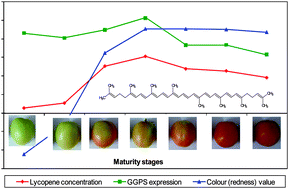A team from the Central Food Technological Research Institute in India has identified the expression pattern of carotenoid biosynthetic pathway genes during tomato ripening. Their results may provide insight into devising gene-based strategies for enhancing carotenoid accumulation in tomato fruits. This has significance because consumption of fruit and vegetables, especially tomatoes, has been linked with a reduced risk of cancer in epidemiological studies: evidence increasingly suggests that this is due to the antioxidant effect of carotenoids. 
The ripening of tomato fruit is a highly regulated process during which co-ordinated genetic and biochemical events take place leading to changes in fruit texture, aroma, colour and flavour. One of the most important and noticeable changes during ripening is the change in pigmentation due to a massive accumulation of the bright red carotenoid lycopene.
In this study, Singh Negi and co-workers investigated the expression of carotenoid biosynthetic pathway genes and the lycopene content at different stages of maturity in tomato fruit. The results revealed that there was an increase in the levels of upstream genes of the carotenoid biosynthetic pathway 5 days before lycopene content peaked. Lycopene accumulation also coincided with the colour values at different stages of maturity. This complete gene expression analysis could inform strategies for enhancing the accumulation of lycopene in tomatoes, thus increasing their potential health benefits.
Interested in knowing more? Read the full article here!
Expression of carotenoid biosynthetic pathway genes and changes in carotenoids during ripening in tomato (Lycopersicon esculentum)
Kanakapura Krishnamurthy Namitha, Surya Narayana Archana and Pradeep Singh Negi
Food Funct., 2011, Advance Article
DOI: 10.1039/C0FO00169D










